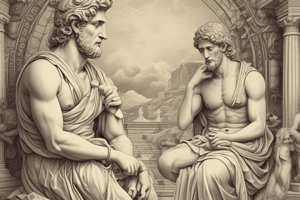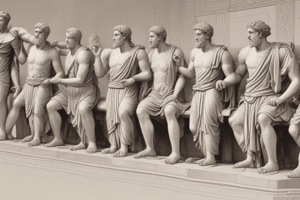Podcast
Questions and Answers
What does Xenophanes suggest about the nature of gods across cultures?
What does Xenophanes suggest about the nature of gods across cultures?
- Gods are universally depicted as similar to one another.
- Each culture has a single true god.
- Gods exist only in the minds of individuals.
- Culture shapes the appearance and behavior of gods. (correct)
What is the essential premise of Atomism as described?
What is the essential premise of Atomism as described?
- Matter can be divided infinitely without any limits.
- Everything is made up of indivisible bodies called atoms. (correct)
- Perception is a more reliable source of knowledge than reason.
- Atoms are just theoretical concepts without physical existence.
Which virtue is NOT one of the characteristics that citizens of an ideal state should embody according to Aristotle?
Which virtue is NOT one of the characteristics that citizens of an ideal state should embody according to Aristotle?
- Courage
- Moderation
- Pride (correct)
- Justice
What characterizes the Sophists' approach to knowledge?
What characterizes the Sophists' approach to knowledge?
What does Aristotle's concept of hylomorphism refer to?
What does Aristotle's concept of hylomorphism refer to?
Which statement reflects Socratic philosophy?
Which statement reflects Socratic philosophy?
How does Epicureanism propose that one achieves eudaimonia?
How does Epicureanism propose that one achieves eudaimonia?
In Plato's allegory of the cave, what does the cave represent?
In Plato's allegory of the cave, what does the cave represent?
What is the main teaching of Cynicism as represented by Diogenes?
What is the main teaching of Cynicism as represented by Diogenes?
According to Plato, what are the three classes of an ideal state?
According to Plato, what are the three classes of an ideal state?
What fundamental conclusion does Pyrrho of Elis advocate in the realm of skepticism?
What fundamental conclusion does Pyrrho of Elis advocate in the realm of skepticism?
What does the term 'Daimonion' refer to in Socratic philosophy?
What does the term 'Daimonion' refer to in Socratic philosophy?
Which statement best summarizes Plato's view on knowledge?
Which statement best summarizes Plato's view on knowledge?
In Stoicism, what does cosmopolitanism promote?
In Stoicism, what does cosmopolitanism promote?
Which philosopher emphasized the importance of self-sufficiency through asceticism?
Which philosopher emphasized the importance of self-sufficiency through asceticism?
What does Aristotle associate with the role of God in the universe?
What does Aristotle associate with the role of God in the universe?
What is the primary focus of Neoplatonism in relation to God's nature?
What is the primary focus of Neoplatonism in relation to God's nature?
Which term refers to the highest knowledge in Neoplatonism?
Which term refers to the highest knowledge in Neoplatonism?
What concept represents the 'fundamental substance' from which everything originates in Neoplatonism?
What concept represents the 'fundamental substance' from which everything originates in Neoplatonism?
In Neoplatonism, what does the term 'Catharsis' refer to?
In Neoplatonism, what does the term 'Catharsis' refer to?
How does Neoplatonism view the relationship between history and divinity?
How does Neoplatonism view the relationship between history and divinity?
What was the primary focus of the natural philosophers from Ionia?
What was the primary focus of the natural philosophers from Ionia?
Which philosopher proposed that water is the fundamental substance of the universe?
Which philosopher proposed that water is the fundamental substance of the universe?
What principle did Anaximenes believe was the main substance of the universe?
What principle did Anaximenes believe was the main substance of the universe?
What does the phrase 'Panta rhei', associated with Heraclitus, convey about reality?
What does the phrase 'Panta rhei', associated with Heraclitus, convey about reality?
Which of the following statements best reflects the shift in understanding from myth to philosophy in ancient Greek thought?
Which of the following statements best reflects the shift in understanding from myth to philosophy in ancient Greek thought?
How did the polis culture differ from Mycenaean culture?
How did the polis culture differ from Mycenaean culture?
What does the term 'Philos-Sophia' signify in the context of ancient Greek philosophy?
What does the term 'Philos-Sophia' signify in the context of ancient Greek philosophy?
Which of the following best describes the role of myth in ancient Greek understanding of reality?
Which of the following best describes the role of myth in ancient Greek understanding of reality?
Flashcards
Myth
Myth
The ancient Greek system of explaining the world through stories of gods and supernatural beings, often passed down through generations.
Philosophy
Philosophy
A way of understanding the world based on reason, logic, and evidence, seeking to find natural explanations for phenomena.
Greek Miracle
Greek Miracle
A period in ancient Greece characterized by a shift from myth-based explanations to a rational understanding of the world.
Polis
Polis
Signup and view all the flashcards
Natural Philosophers
Natural Philosophers
Signup and view all the flashcards
Panta Rhei
Panta Rhei
Signup and view all the flashcards
Fire as a principle
Fire as a principle
Signup and view all the flashcards
War as harmony
War as harmony
Signup and view all the flashcards
Atomism
Atomism
Signup and view all the flashcards
Socratic Method
Socratic Method
Signup and view all the flashcards
Daimonion
Daimonion
Signup and view all the flashcards
Plato's Theory of Forms
Plato's Theory of Forms
Signup and view all the flashcards
Plato's Ideal State
Plato's Ideal State
Signup and view all the flashcards
Allegory of the Cave
Allegory of the Cave
Signup and view all the flashcards
Sophists
Sophists
Signup and view all the flashcards
Heraclitus's River
Heraclitus's River
Signup and view all the flashcards
Arche
Arche
Signup and view all the flashcards
Physis
Physis
Signup and view all the flashcards
Logos
Logos
Signup and view all the flashcards
Cosmos
Cosmos
Signup and view all the flashcards
Sophia
Sophia
Signup and view all the flashcards
Hylomorphism
Hylomorphism
Signup and view all the flashcards
Zōon politikon
Zōon politikon
Signup and view all the flashcards
Eudaimonia
Eudaimonia
Signup and view all the flashcards
Cynicism
Cynicism
Signup and view all the flashcards
Skepticism
Skepticism
Signup and view all the flashcards
Stoicism
Stoicism
Signup and view all the flashcards
Cosmopolitanism
Cosmopolitanism
Signup and view all the flashcards
Study Notes
Foundations of Philosophy: Ancient Greek Thought
- Ancient Greek philosophy emerged as a departure from mythological explanations of the world.
- Mythological explanations of the world and human origins were not questioned.
- Ancient Greek philosophers sought to understand the world through reason and observation.
- Greek philosophers believed in a natural order, and sought to discover the laws that governed it.
Myth vs. Philosophy
- Myth relied on supernatural explanations while philosophy questioned these.
- Myth provided explanations of reality's origins, human existence, and nature.
- The nature of reality and the beginnings of the world were explained by myths, which weren't open to reinterpretation or questioning.
- Mythologies often linked the world of gods with the world of men.
- A lack of awareness of the passage of time was a key component of myth.
Philos-Sophia
- "Philos" means "love" and "Sophia" means "wisdom".
- The "Greek Miracle" marked a shift in understanding the world from myth to reason.
- This shift was marked by a rapid development of philosophical thought in Ancient Greece.
Mycenaean & Polis Cultures
- Mycenaean culture (18th - 10th century BCE) was characterized by "Palace economies" under a single or small group of leaders.
- Writing and reading were limited to a small group of scribes.
- The polis culture (8th century BCE - 2nd century CE) was based on social organization.
- Citizens participated in political life through meetings in the agora.
The Rise of "Natural Philosophers"
- Natural philosophers emerged in Ionia (present-day Turkey).
- They focused on understanding the natural world, including movement, change, cause, and effect.
- Natural philosophers believed that the natural world was governed by an order that humans could understand and describe.
Thales of Miletus (c. 624-546 BCE)
- Thales believed that water was the fundamental substance of the universe.
- He believed that natural laws governed existence, not gods.
- The world contained gods, but gods were not necessary to explain how the world worked.
Anaximenes of Miletus (c. 586-526 BCE)
- Anaximenes proposed that air was the fundamental principle of the universe.
- Air, being in constant motion, could take on different densities.
- Anaximenes developed a scientific approach to understanding the world's workings.
Heraclitus (c. 540-480 BCE)
- Heraclitus believed that fire was the fundamental principle from which all other things came.
- Change and a constant state of flux underlie the universe.
- He proclaimed "Panta rhei" ("everything flows").
Xenophanes (c. 570-478 BCE)
- Xenophanes challenged the idea that gods were in human form.
- He observed that different cultures created gods in their own image.
Atomism (c. 570-478 BCE)
- Atomism postulated that matter was made of indivisible particles (atoms).
- There was an empty space between atoms - "the void".
- This contrasted with earlier ideas that matter had infinite divisibility.
Sophists (c. 570-478 BCE)
- Sophists were teachers who focused on practical skills rather than abstract knowledge.
- They were often critics of existing social and political institutions.
- The Sophists moved Greek philosophy away from abstract cosmology to examining political matters.
Socrates (469-399 BCE)
- Socrates focused on ethics and knowledge.
- He used the Socratic method, which involved rigorous questioning to stimulate critical thinking.
- The unexamined life is not worth living.
Plato (c. 424-348 BCE)
- Plato, a student of Socrates, developed the Theory of Forms.
- He argued that the physical world is a shadow of a more perfect world of Forms.
- He used the allegory of the cave to explain this.
- He also explored idealized political systems.
Aristotle (384-322 BCE)
- Aristotle, a student of Plato, emphasized observation and empirical evidence.
- He developed the concept of hylomorphism.
- He believed in a monotheistic God guiding the universe's operations, but without involvement in daily affairs.
- Aristotle viewed humans as "political animals," with a need for community.
Hellenistic Philosophy
- The decline of the Greek city-states affected philosophy.
- Hellenistic philosophy shifted toward individual ethical questions and the pursuit of happiness.
Epicureanism (341-270 BCE)
- Epicureanism advocated for a life focused on pleasure and the avoidance of pain.
- Pleasure itself was defined as freedom from physical and mental disturbances.
- A method of obtaining happiness involved restricting desires to natural and necessary ones, cultivating friends, and gaining knowledge about external threats.
Cynicism (c. 412-323 BCE)
- Cynicism rejected conventional values like wealth and power.
- It advocated for self-sufficiency (autarky) through asceticism.
- Essentially, they aimed for freedom from social constraints through a rejection of societal norms.
Skepticism (c. 365-275 BCE)
- Skeptics questioned the possibility of attaining reliable knowledge.
- Advocated for suspending judgment to achieve mental peace.
- They felt that accepting traditions, customs, and laws were a more practical approach.
Stoicism (c. 334-262 BCE)
- Stoicism emphasized living in harmony with nature.
- Stoics believed in a divine, rational principle governing the universe.
- They advocated for cosmopolitanism and a sense of living in harmony with nature.
Neoplatonism (3rd century CE)
- Neoplatonism revived Plato's ideas, but focused on a mystical path.
- God was presented as the ultimate source of all existence.
- This path to understanding God involved contemplation.
Antiquity vs Christianity
- Antiquity viewed history as cyclical or based on the concept of eternal return.
- Christianity viewed history as linear.
- In Christianity, God had created the universe for a specific purpose (not simply accepting natural laws).
- Christian beliefs emphasized that humans were not simply part of nature, but had spiritual aspects.
Ancient Philosophy - Dictionary
- Key terms and their definitions from ancient Greek philosophy. (Includes: Arche, Physis, Logos, Cosmos, Episteme, Sophia, Eudaimonia, Arete, Catharsis)
Studying That Suits You
Use AI to generate personalized quizzes and flashcards to suit your learning preferences.




